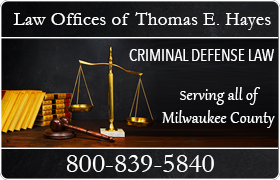Cudahy Felony Lawyer, Wisconsin
Sponsored Law Firm
-
 x
x

Click For More Info:
-
Law Offices of Thomas E. Hayes
161 W Wisconsin Ave Suite 3032 Milwaukee, WI 53203» view mapMilwaukee County Criminal Defense Over 30 Years of Experience
Clients should be comfortable with their lawyer. I am the only one who "works" my cases. My work ethic is efficient result oriented.
800-839-5840
FREE CONSULTATION
CONTACTFREE CONSULTATION
CONTACTFREE CONSULTATION
CONTACTOhioma Emil Ovbiagele
Employee Rights, Child Custody, Felony
Status: In Good Standing Licensed: 10 Years
Scott Van Klompenburg
Traffic, Health Care Other, Wills & Probate, Felony
Status: In Good Standing Licensed: 12 Years
Rebecca D. Boyle
Education, Real Estate, Defect and Lemon Law, Lawsuit & Dispute, Felony
Status: In Good Standing Licensed: 37 Years
Joseph Francis Fischer
Traffic, Employee Rights, Misdemeanor, Felony
Status: In Good Standing Licensed: 28 Years

 Thomas Hayes Milwaukee, WI
Thomas Hayes Milwaukee, WI Contact UsRequest Consultation Now
Contact UsRequest Consultation Now Law OfficeLaw Offices of Thomas E. Hayes
Law OfficeLaw Offices of Thomas E. Hayes
